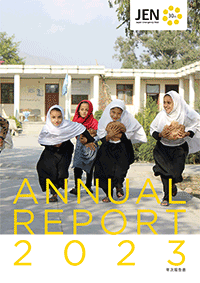From Gaza refugee camp to Za’atari refugee camp
For Wael abu Lehieh, a young engineer, there seems to be no big difference between what he is now experiencing at Za’atari refugee camp and what he himself was involved in at Gaza refugee camp.
By utilizing his own experiences at Gaza refugee camp, Wael is supervising the construction work at Za’atari refugee camp to connect sewer pipes among facilities, which is the first phase of the sewer network project.
[Wael is writing down daily progress report in JEN caravan of the basecamp]
The sewer network project was launched in December, 2016 by JEN and other groups supporting Syrian refugees in the camp in order to connect sewer networks among schools, hospitals, Mosque and other facilities. Supplying concrete separation tanks, spreading sewer pipes, setting manholes and some other work concerned are included in these sewer network constructions.
The WASH-service offer is under the management of JEN. A total 58 of organizations and facilities in the base camp with almost all NGO offices and in the 3rd, 4th and 5th sections of refugee camp will be working together through the sewer network.
He usually starts his daily work with walking around the 3rd, 4th and 5th sections, looking around the site of the camp and checking activity points of the previous day. Then, he makes a construction plan for digging and spreading of water pipes, and at the same time finishes office-related work without fail.
Today, a concrete tank was set up around the reception area of the camp and was connected to sewer network. A heavy industrial machine is used for construction and it also raises and lowers a huge separation tank. Therefore, safety is the first under construction.
[JEN staff watching a separation tank being raised]
[The construction connecting a separation tank to toilets of school with a pipe]
Wael says:
“Before coming to Za’atari refugee camp, I was involved in sewer network construction as a refugee under a contractor at Gaza refugee camp. I came to have further sense of responsibility to offer the work in the highest quality to residents in the camp and my community, and I accomplished it.”
The same approach he utilized in Gaza camp was used in Za’atari camp. This approach aims for Syrian refugees to work in the project through CFW*. This approach can not only support refugees economically but also foster their independence and sense of responsibility regarding infrastructure of the camp.
In the process of construction, some checks concerning the depth of digging holes, degree of leaning of pipe, place of a manhole, making steps, and insulation were carried out as well as water examination. As the construction progresses, every record and result of the examination has to be rechecked and reported every day in order to guarantee its quality and quantity.
[Height is measured to guarantee adequate leaning of a pipe]
[Photo top: dry the receiver under the manhole/Photo bottom : steps inside the manhole]
Za’atari refugee camp is now changing to a town and Wael is looking for a new, future project as he is getting good results in his work now.
The project at present is expected to complete at the end of February, 2017, when a total 103 tanks are introduced and a total of 2km pipe are spread. The second phase of sewer network construction will start in March, so the construction on the first phase needs to be finished by the end of February. The schedule is quite tight.
On the second phase, all tanks introduced on the first phase will be connected to the sewage plant.
Wael abu Lehieh
JEN Jordanian engineer
*CFW (support by value for labor) is a support program promoting revival of the destroyed area in a way that sufferers themselves work for its restoration / revival while achieving value for their labor.

![Jordan[Syrian refugees] Blog](/en/project/images/mainimg_project_jordan.jpg)









